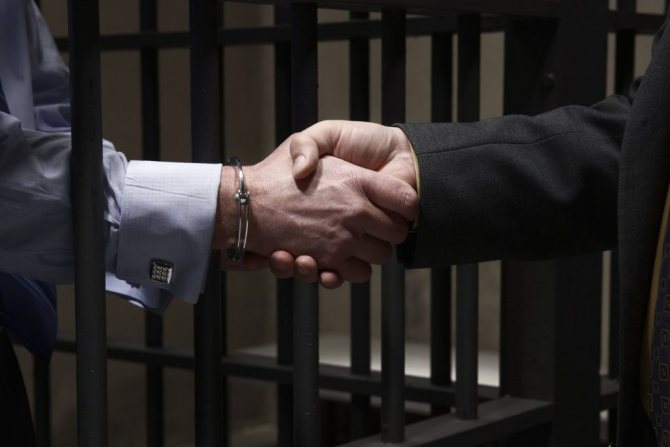Termination of a criminal case by reconciliation of the parties
A criminal trial is the result of a crime. It involves two parties: the victim and the accused. The first wants to ensure the punishment of the perpetrator and receive compensation for the damage suffered. The second is the alleged criminal, who can be either punished or acquitted during the trial.
Sometimes the parties are willing to compromise. Based on Article 25 of the Code of Criminal Procedure of the Russian Federation, the case can be dismissed if the participants in the process agree to reconciliation. A similar possibility is also indicated in Article 76 of the Criminal Code of the Russian Federation.
The readiness of the parties for reconciliation does not always allow the criminal case to be closed. For example, if the accused committed murder, he will not be able to get away with repentance and payment of financial compensation to the injured party. If we are talking about theft or petty hooliganism, then the case can be closed, dropping all charges against the suspect.
Reconciliation of parties in a criminal case, basic rules and requirements
According to the legislation of the Russian Federation, when considering a case, the outcome of the process can be changed by mutual agreement of two participants in the trial - the accused and the victim. Even if the fact of committing a crime is proven, the defendant has a chance to avoid a prison sentence. However, there are conditions that must be met.
In what situations is reconciliation of the parties in a criminal case allowed? It is important to know about the conditions to whom this rule may apply.
There is a strict sequence in the process of finding a compromise with the victim. The defendant must make full repentance, official recognition of his actions against the plaintiff, an apology and compensation for damages.
The amount of compensation for harm and damage depends on the crime committed and is established by agreement of the two parties. If the victim accepts the terms of the accused, then a compromise can be reached.
On a note. An official document from the plaintiff is the main factor in the possibility of dismissal of the criminal case.
Crimes of medium gravity are punishable by imprisonment from 24 to 60 months. The judge has the right to demand compliance with all points to close the case.
The law specifies the basic requirements for writing a petition for the possibility of resolving a conflict in a criminal case.
In an official document, all data must be entered correctly and filled out without pressure from any side. If a criminal case is closed due to reconciliation of the parties, is there a criminal record? The petition for reconciliation of the parties in criminal proceedings must indicate.
What conditions must be met for reconciliation?
Criminal law is based on strict compliance with a number of conditions. Following a certain algorithm allows you to reduce the likelihood of errors in sentencing.
The process of reconciliation in criminal proceedings requires the following conditions to be met:
- The consent of both parties is required.
- The culprit must make amends to the victim. To do this, he apologizes and compensates for the harm.
- The victim or his lawyer draws up a petition in which he asks to terminate the criminal proceedings. It is important to indicate in the document that agreement was reached between the parties, and the decision was not made under pressure.
- If the case does not reach the court, then the decision to complete the process in connection with the reconciliation of the parties can be made by the investigator or inquiry officer. This is only possible with the consent of the prosecutor.
- The victim is informed that if the case is terminated, the defendant will not be held liable for the crime committed.
What does the application look like?
The sample application is individual for each individual case.
It must contain the following information:
- Name and address of the authority where the application is submitted;
- Initials, actual address of the person filing the petition;
- Main content: a brief summary of the case that needs to be closed, the article under which it is qualified;
- A description of the specific actions taken by the accused in order to make amends and resolve the conflict;
- Request to close criminal/civil proceedings in connection with reconciliation of the parties;
- A mandatory sentence that there are no further claims against the perpetrator;
- Date of application and personal signature of the applicant.
When is reconciliation possible?
Not every criminal trial can be completed by agreement of the parties. The Criminal Code of the Russian Federation establishes the following requirements, subject to which reconciliation becomes possible:
- the offender has not previously been prosecuted;
- a crime of minor or moderate gravity has been committed;
- The parties reconciled and agreed on the amount of compensation.
The trial cannot end with reconciliation if the perpetrator has committed a serious or especially serious crime.

Reconciliation during civil proceedings
One of the most common types of reconciliation of the parties is the termination of a criminal case with the use of a settlement agreement as a result of successful negotiations, which is regulated by the Code of Civil Procedure, Article 39, Part 1. Mandatory requirements that allow reaching a compromise on the current situation are:
- Article 173 and 326.1 of the Code of Civil Procedure, the reconciliation procedure is possible in two instances.
- The conclusion of an agreement must satisfy the current rules of the Code of Civil Procedure and not infringe on the rights and interests of other persons.
- The process will be considered completed after the application is approved by the court. As a result, the parties will not have the opportunity to re-apply to the court on this issue.
Also read: What is said in Article 158 of the Criminal Code of the Russian Federation: theft
An alternative option for reconciling the parties is the mediation process, which implies the participation of a qualified specialist in resolving the dispute. At the end of the process, a mediation agreement is signed, for which the following requirements must be met:
- The process can be initiated by interested parties or a judicial authority.
- During the necessary steps according to the procedure, consideration of a civil case is not carried out. Regulated by Article 169 of the Code of Civil Procedure.
- Execution of the agreement is allowed exclusively on a voluntary basis, in accordance with Federal Law No. 193, part 2, article 12.
- An agreement accepted and agreed upon by all parties can be used as a settlement agreement, which is approved by a judicial authority.
In the Russian Federation, the method of mediation is not often used in civil proceedings. This is due to innovations that are incomprehensible to many citizens.
Is reconciliation considered a criminal record?
In this case, the presumption of innocence, enshrined in Article 14 of the Code of Criminal Procedure of the Russian Federation, applies to the accused. The citizen will be considered innocent until his guilt is recognized by the court. If the trial is terminated without a verdict, then all acquittals against the accused are withdrawn. Accordingly, a criminal record is not recorded.
However, in the information database of the Ministry of Internal Affairs there remains a record that the person was prosecuted under a certain article, but was not convicted due to the reconciliation of the parties. Employers and other interested parties will be able to access this data.
Have a question for a lawyer? Ask now, call and get a free consultation from leading lawyers in your city. We will answer your questions quickly and try to help with your specific case.
Telephone in Moscow and the Moscow region: +7
Phone in St. Petersburg and Leningrad region: +7
Free hotline throughout Russia: 8 (800) 301-39-20
Mechanism of the conciliation process
Often the conciliation process is initiated before the criminal case is considered. This happens if the parties have reached an agreement in advance.
To achieve reconciliation in court, participants in the process must follow the following algorithm:
- Having begun the consideration of the case, the judge explains to the parties their rights.
- Participants are invited to attach petitions to the case file. At this stage, the plaintiff must declare a desire to reconcile with the defendant. Next, he submits a petition to the judge.
- The text of the document is read out in the courtroom.
- Each participant in the process gets the opportunity to speak.
- The prosecutor and interested parties have the right to ask questions to the applicant citizen. So they check the fulfillment of the conditions necessary for the reconciliation of the parties.
- If agreement has been reached and the parties have no claims against each other, the judge closes the case.
Who decides on possible reconciliation of the parties?
The judge has the right to decide how much reconciliation is possible, and before the trial, the inquiry officer (with the prosecutor’s approval) or the investigator. They make a positive decision if the parties are ready to make peace, subject to the following conditions:
- The offense was committed for the first time. Before this, the perpetrator had never been prosecuted (or was prosecuted but was released from it). Often used in relation to teenagers and young girls.
- The crime should not be from the category of grave or especially grave.
- The perpetrator must apologize to the victim sincerely and publicly.
- The perpetrator must repent of what he has done and have the desire and opportunity to make amends to the victim. It could be:
- Monetary compensation for moral damage;
- Material (in the form of return of stolen valuables or their value);
- Providing all possible measures to restore health lost due to the fault of the criminal.
- The victim himself must express a desire to reconcile with the offender. This decision should not be made under any pressure from the criminal or other persons who act on his behalf.
- The accused agrees to end the case with a peace agreement.
This means that in order for reconciliation of the parties to become possible, the criminal will have to work hard to make amends and compensate for all the damage. The law also allows for the possibility that the accused may accept financial liability in excess of the damages in order not only to make amends, but also to help the victim recover from the crime.
When reconciliation is impossible
Participants can reconcile if one of the parties submits a corresponding petition to the judge. But in some cases this may not be enough, even if the perpetrator sincerely repents and is ready to compensate the victim for material damage.
Reconciliation is impossible in the following situations:
- The crime was committed on the basis of intolerance. We are talking about manifestations of racism, Nazism, hatred on religious grounds, etc.
- One citizen slandered another. Here it is necessary to take into account the circumstances under which false information was disseminated. If a person denounces a neighbor because of personal hostility, the case may be closed. If hatred arose due to political, religious or other reasons of social significance, reconciliation will be impossible.
- The criminal's motives were hooligan, demonstrating disrespect for moral standards, personality, and the established order.
Reconciliation in the situations described above is not practiced for the reason that the actions of the perpetrator are of a mass nature. There is no guarantee that after the termination of the criminal case, the defendant will not resume criminal activity. Attackers driven by the motives described above pose a danger to society. Therefore, the criminal must be punished.

Review of problematic issues
Despite the careful study of each law, the current legislation has many gaps and controversial issues. If we talk about reconciliation of the parties, here we need to highlight the following problems:
- Article 25 of the Code of Criminal Procedure of the Russian Federation does not define a clear list of criminal actions for which reconciliation is possible. Only the degree of severity is indicated, but in some cases its boundaries may be vague.
- Absence of direct prohibitions on reconciliation of the parties. In some cases, such actions are inappropriate, but are permissible from the point of view of current legislation. For example, as a result of the defendant’s negligent actions, the victim died. Then the rights are transferred to one of the relatives of the deceased, who can offer reconciliation of the parties.
- There is no clear list of grounds when reconciliation is possible. The current legislation defines only the main ways of using this opportunity. A clear legislative framework regarding the reconciliation of the parties has not yet been formed.
Assistance from lawyers
When planning to reconcile with an opponent, it is better for the plaintiff to consult with a specialized lawyer. A specialist will help determine requirements and assist in negotiations. Often people cannot accurately formulate all the conditions for reconciliation due to lack of experience, emotions, etc.
A lawyer will help you choose a more productive way of communication, taking into account legal norms and personal experience in negotiations. In addition, the lawyer is able to predict possible scenarios, determining the most beneficial solution for both parties.








